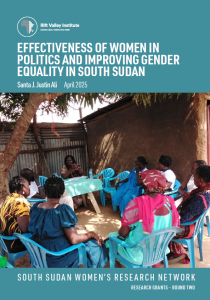This report argues that, in order to improve women’s participation in politics and promote gender-responsive policies in the country, there is a need to enlarge government capacity for women’s leadership by introducing equal gender quotas for decision-making positions.
Summary
Women’s participation in politics is an important measure of gender equality in a country, one that reflects the status and position of women in its society as a whole. This research report aims to assess the effectiveness of women’s participation in politics from the perspective of South Sudan.
In early 2025, the future of South Sudan’s transitional government remained uncertain, following the postponement of elections in December 2024. These would have been the first elections held since South Sudan’s independence in 2011 from Sudan, its northern neighbour. On top of this postponement, a lack of economic development in South Sudan—coupled with the impact of climate change and increasing socioeconomic difficulties—has worsened the situation in the new nation, as well as prospects for South Sudan’s ultimate test of building a modern democratic state.
The elections were expected to wrap up a transition period laid out in the 2018 Revitalized Agreement to the Resolution of the Conflict in the Republic of South Sudan (R-ARCSS). Their postponement, by 24 months, has been met with a feeling of considerable frustration among South Sudanese women eager to exercise their participation in politics as a constitutional right.
Women in South Sudan have played a critical role in politics and governance throughout the ages, even if historically they have not fully participated in political structures. While they have had some successes, the representation of women in all aspects of life, most especially political life, has been less effective than it could be, and often exacerbated by negative social norms and a lack of capacity-building interventions tailored to women.
The ultimate objective of this report is to understand how effective women in South Sudanese politics are now and some of the current reasons for their under-representation. It is also to find solutions to the problem from women’s points of view.
This study used qualitative methods to explore how effective women have been in politics and improving gender equality in South Sudan to date, and to describe what the meaningful participation of women in political leadership and decision-making looks like. The study’s primary data were collected through interviews, focus group discussions and the oral testimonies and stories of stakeholders. Legal documents were also reviewed and analysed from a gender perspective.
The study’s results show that, while there are signs of positive change and progress, many women have been (and continue to be) systematically denied the opportunity to participate in politics, largely because of cultural norms (and the political system’s adherence to them), as well as because of a lack of interest in enacting existing policies to protect women’s rights in politics and the under-funding of gender policies and activities. As a result, most of the legislation relevant to women’s representation remains in draft form, illustrating a lack of political will on the part of the government to promote women’s participation in politics.
Recommendations
- The South Sudan government should include more women in decision-making positions and ensure the active participation of women in all sectors.
- The government should establish a legal protection mechanism for the participation of women in elections and implement policies for protecting women’s rights in elections.
- Women political leaders, including government ministers, should cooperate across party divides at all levels of parliament, and women should act to achieve representation at all other levels of government, too.
- Government, non-governmental organizations (NGOs), and civil society organizations (CSOs) should lobby for funds for women’s empowerment to enable women to stand and participate in elections.
- The government should carry out a public education campaign to encourage women and girls to improve their education and leadership capacities. Capacity-building initiatives could focus on educating women about their rights, electoral processes and advocacy strategies.
- Research institutions should invest in high-quality research and on gathering data (disaggregated by sex) on political participation and economic empowerment.
South Sudan Women’s Research Network
This report is a product of the EU-funded South Sudan Women’s Research Network (SSWRN), which provides research grants, training and mentorship to early career female researchers. It is administered by the Rift Valley Institute. The project aims to ensure that women’s perspectives are included in research and decision-making on development issues in South Sudan.




